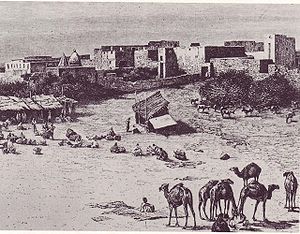
http://www.joshuaproject.net/peopctry.php?rop3=100175&rog3=KE
What Are Their Lives Like?
The semi-nomadic Ajuran live in portable huts made of bent saplings covered with animal skins or woven mats. The tents are easily collapsible so that they can be loaded on their camels and moved along with the herds. Villages are made up of several related families. Their huts are arranged in a circle or semi-circle surrounding the cattle pens. The village is enclosed by a thorn-shrub hedge to protect them from intruders or wild animals. The men's responsibilities include caring for the herds. The women are in charge of both homemaking and home building. They milk the animals, cook, and tend to their families.
The moving patterns of the Ajuran are dependent on the unpredictable grazing region and climate of the area in which they live. If water or grazing land becomes scarce, the families pack up their portable huts and move across the desert. The wealth of most Ajuran is in their herds of camels, cattle, goats, or sheep.
According to Islamic law, a man is permitted to have as many as four wives. Polygamy is commonly practiced among the Ajuran. Unfortunately, the divorce rate is very high. The children of divorced parents are usually split by gender; the wife takes the girls and the husband takes the boys.
Formerly the Ajuran's diet consisted almost entirely of milk products; however, maize and rice are now usually included. Chewing qat, a mildly hallucinogenic stimulant, is a favorite social pastime.
Ajuran women lead very difficult lives, usually being treated no better than slaves. Some believe that women have no souls. Occasionally, new brides are beaten by their husbands so that they will learn submission. The men expect their wives to bear them many children, so the women often face back-to-back pregnancies. Because malnutrition is a problem, the women must fight for the survival of their children. The wives live in separate huts from their families.
What are their beliefs?
The Somali tribes were converted to Islam in the 1400's. Today, the Ajuran are virtually all Shafiite Muslims. They are very orthodox in their religious practices. Some of them even believe that they descended from Arab Muslims. However, linguistic research shows this is not the case.
Although the Ajuran are staunch Muslims, few of them have a deep understanding of their faith. They are a very proud people who consider Christians to be inferior. Muslims consider Jesus to be a prophet, a teacher, and a good man, but not God's son. They also believe that all men and animals will give account for their actions after they die. They believe that they will be judged by their good works and by their knowledge of the Koran. Muslims say prayers five times a day while facing Mecca.
http://www.civicwebs.com/cwvlib/africa/somalia/1994/dawn_of_civilization/chapter_3.htm
These ancient people were pure specimens of the Somali people. They were very intelligent and skilled in engineering works. They could build wells even in hard rocks, make caves and also draw figures in the caves in the mountains in ancient times. They were very beautiful and good people. Some of their descendents are still living in the central region of Somalia and in the Galla Sadame region of Ethiopia. They have a sense of nobility and beauty. Their ancient techniques of boring wells in the rocks is not lost; we do not know anything about them now. Whenever any archeological place is discovered, the Somali believe that the Ajhurans may have built it. The first President of independent Somalia, Ahmed Abdulla Osman, was an Ajhuran; his sub-tribe was Ogaden.
1 comment:
Great post, I was so excited to see this article. Being an Ajuran now living in Sweden. Read more on Ajuran State: http://en.wikipedia.org/wiki/Ajuran_Sultanate
Post a Comment